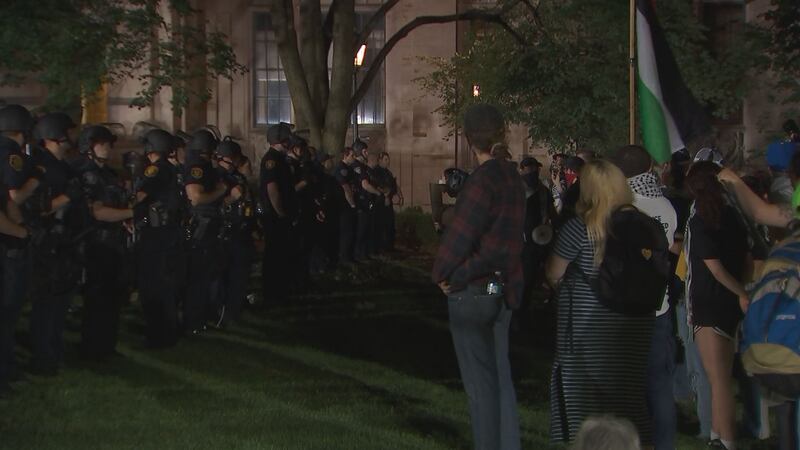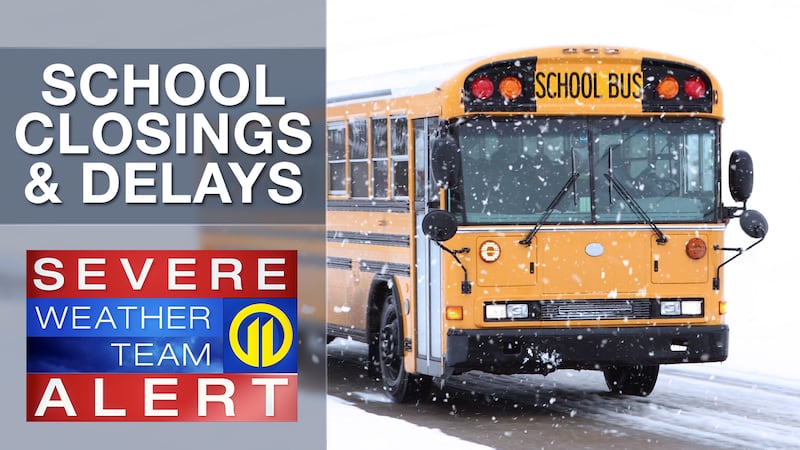PITTSBURGH — For the first time since pro-Palestinian protesters cleared out their encampment at the University of Pittsburgh, we’re hearing from local leaders about how they were able to de-escalate the situation.
Mayor Ed Gainey, County Executive Sara Innamorato and Pittsburgh’s Public Safety Director, Lee Schmidt said they met with self-identified Palestinian and Jewish students and Pitt faculty for close to three hours Monday night into Tuesday morning with the goal of clearing out the encampment and getting everyone home safely.
Gainey says after violence began escalating, resulting in an officer being knocked to the ground along with some fencing and a protester being cut, city leaders grew increasingly concerned.
“We can’t bring peace and we can’t bring safety if we don’t engage in the situation and try to de-escalate it in ways that everybody goes home safe,” Gainey said.
>> Protesters defaced Cathedral of Learning, Frick Fine Arts Building on Sunday, Pitt Chancellor says
The mayor says this wasn’t about the demands of protesters, it was about getting people to clear out after engaging in a meaningful conversation. The city’s public safety director said they were honest with protesters about arrests or tear gas possibly being used if anything escalated to violence, which it fortunately did not.
Gainey says within 30 minutes of that late-night meeting, the protesters cleared up the encampment and moved out by 2 a.m.
The University of Pittsburgh sent Channel 11 the following statement:
“Following two days of demonstrations, protesters voluntarily left the encampment Tuesday morning. The Mayor’s office, in close coordination with University leadership and public safety teams from the University of Pittsburgh, City of Pittsburgh Police, Allegheny County Sheriff’s office, and Pennsylvania State Police led negotiations with protesters who were largely unaffiliated with the University. The Cathedral of Learning lawn is now cleared, and the rest of the campus is open and under normal operations. The University is thankful for the support it received from the Mayor’s office, the University of Pittsburgh Police Department, and other local officials and law enforcement agencies.”
The city, however, says they did meet with people who identified themselves as Pitt students and staff.
Gainey also wanted to make it very clear that he has no tolerance for hate of any kind in the City of Pittsburgh.
“We have seen a rise in antisemitic behavior,” Mayor Gainey said. “Let me say this right now, I condemn any antisemitic behavior in this city. We don’t need that here and I want to make that known right now. And I’m speaking to everyone in this city when I say we condemn antisemitic behavior.”
Gainey shared the following statement:
“Over the past several months, I’ve had the opportunity to hear from leaders and members of our Jewish community, as well as those from our Palestinian and Arab communities. The thing that I keep hearing, is that they all want to live in a city where they can feel safe at work, safe at school, safe in their places of worship, and safe as they go about their lives in our city.
“We have seen a rise in anti-Semitism and a rise in anti-Arab activity, and in order to build a city where everyone can feel safe it is clear to me that the only way we can reach that goal is to honor the humanity of all people. That means continuing to meet with and support our local Jewish community and speaking out against Anti-Semitism and the loss of innocent Israeli lives.
“It also means that we must condemn anti-Arabic activity and recognize the unfolding humanitarian crisis in Gaza and the loss of innocent Palestinian lives. As mayor of the city of Pittsburgh, I have no authority over an international conflict. My role, as mayor of the city of Pittsburgh, is to keep this city safe. And last night our number one priority was about finding a way toward a safe resolution to a situation that had become unstable. As we received information about the increased instability of the encampment, I gathered with members of my senior leadership team and the County Executive. It was at that point that we made the decision to attempt to make contact with the individuals involved with the protest in order to de-escalate the situation.
“As we made contact and sat down to meet, we made it clear to them that this meeting was not an endorsement of their demands. But in order to move people, we needed to break down barriers, and sit down to hear them. Other than sitting down to meet with the Chancellor, we did not discuss any of their demands of the University. Our conversation was focused solely on how to keep everyone safe. We provided them with information about our efforts to attempt to de-escalate the situation and provided our assessment of what was likely to happen so they could make an informed decision for themselves. At the conclusion of our meeting, we facilitated their return to the encampment in order for them to share with all those involved, and they made the decision to leave Pitt’s campus peacefully.”
Download the FREE WPXI News app for breaking news alerts.
Follow Channel 11 News on Facebook and Twitter. | Watch WPXI NOW
TRENDING NOW:
©2024 Cox Media Group







